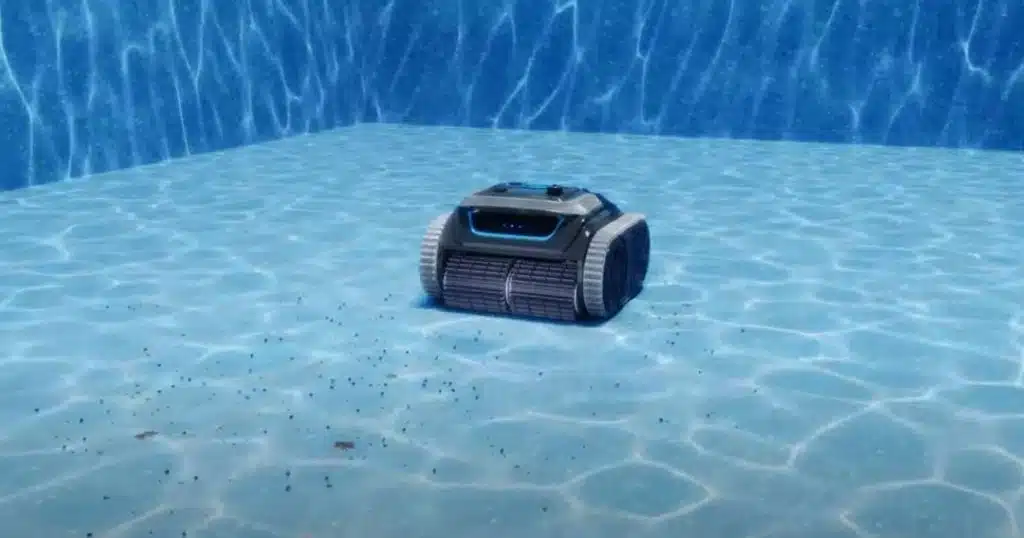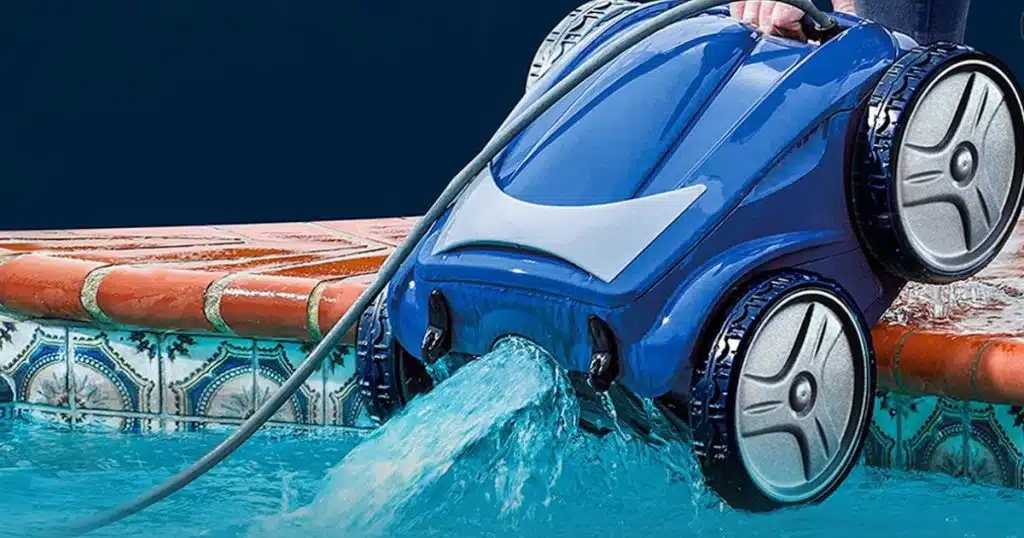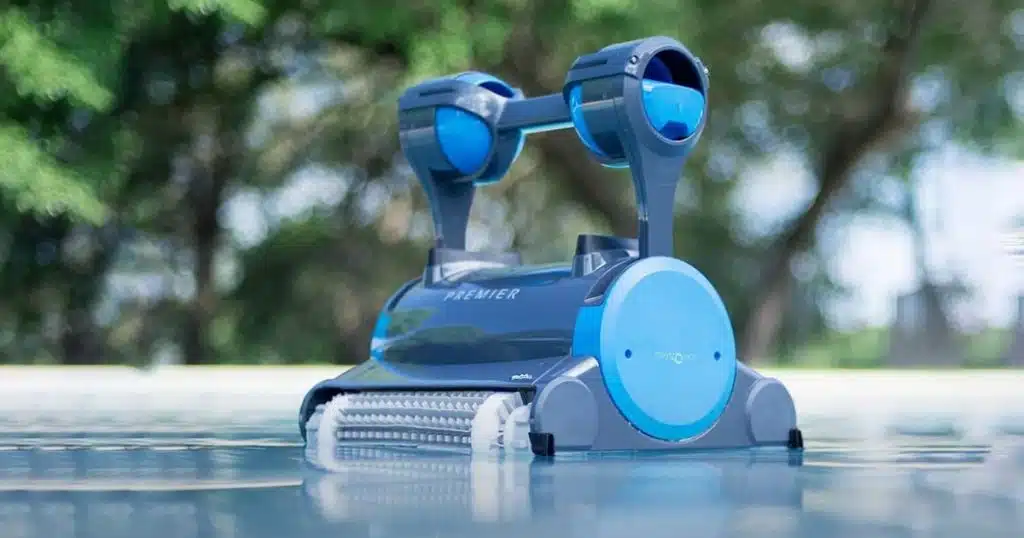As an Amazon Associate I earn from qualifying purchases.
In this ultimate guide to “Cordless Vs Corded Pool Vacuum,” we’ll break down the differences between these two cleaning giants to help you make an informed decision. From hassle-free maneuverability to uninterrupted suction, each option offers unique benefits tailored to your pool cleaning needs. Whether you’re aiming for flexibility or efficiency, understanding the nuances of cordless and corded pool vacuums is key. Join us as we explore the pros, cons, and everything in between, ensuring you choose the perfect vacuum to keep your pool crystal clear all season long.

Compare of cordless vs corded pool vacuum
Feature | Cordless Pool Vacuum | Corded Pool Vacuum |
Mobility | Offers freedom of movement without cords hindering reach or tangling | Limited by the length of the power cord, requiring frequent repositioning |
Power Source | Battery-operated | Requires connection to a power outlet |
Convenience | Quick setup and easy to maneuver around obstacles | May require extension cords for larger pool areas |
Suction Power | Generally less powerful than corded models | Provides consistent and strong suction for thorough cleaning |
Runtime | Limited by battery life, may require recharging during longer cleaning sessions | Unlimited runtime, as long as there’s access to power |
Maintenance | Minimal maintenance requirements | May need occasional cord inspection for wear and tear |
Cost | Typically higher initial investment due to battery technology | Lower initial cost, with potential savings on electricity bills |
Suitability | Ideal for smaller pools or spot cleaning tasks | Best for larger pools or prolonged cleaning sessions |
Understanding Cordless Pool Vacuums
What are Cordless Pool Vacuums?
Cordless pool vacuums are battery-operated devices designed to effortlessly clean debris from your pool without the hassle of cords. They offer unparalleled convenience and flexibility, allowing you to tackle cleaning tasks with ease.
Benefits of Cordless Pool Vacuums
- Freedom of movement without cords tangling or limiting reach.
- Easy maneuverability around obstacles and tight spaces.
- Quick setup and minimal maintenance requirements for hassle-free cleaning sessions.
Drawbacks of Cordless Pool Vacuums
- Limited battery life may require frequent recharging during larger cleaning sessions.
- Less powerful suction compared to corded counterparts, resulting in potentially longer cleaning times.
- The upfront expenses might increase because of battery technology.
Exploring Corded Pool Vacuums
What are Corded Pool Vacuums?
Corded pool vacuums draw power from an electrical cord connected to a power source, ensuring steady suction and dependable performance for effective pool cleaning.
Advantages of Corded Pool Vacuums
- Continuous power supply ensures uninterrupted cleaning sessions.
- Exceptional suction abilities efficiently eliminate dirt, leaves, and debris from every pool surface.
- Cost-effective option with lower initial investment and maintenance costs.
Limitations of Corded Pool Vacuums
- Limited range due to the length of the power cord, requiring frequent repositioning or the use of extension cords.
- Potential tripping hazards posed by the cord, especially in larger pool areas.
- Less flexibility compared to cordless models, restricting movement around the pool.
Important factors to keep in mind when deciding between cordless and corded pool vacuums
When choosing between a cordless and corded pool vacuum, it’s important to carefully evaluate various factors to make sure you pick the most suitable option for your individual requirements.
Pool Size and Type
- Small to Medium Pools: For smaller pools, a cordless vacuum might be sufficient, offering the convenience of cordless operation without the need for extended runtime.
- Large Pools: If you have a larger pool, a corded vacuum’s unlimited runtime and powerful suction might be more suitable to ensure thorough cleaning.
Debris Type and Cleaning Frequency
- Light Debris: If your pool mainly collects fine dirt and light debris, a cordless vacuum with moderate suction power could be adequate.
- Heavy Debris: For pools that frequently collect leaves, sticks, and larger debris, a corded vacuum’s stronger suction power will be more effective.
Convenience and Ease of Use
- Mobility Needs: If ease of movement and quick setup are priorities, a cordless vacuum offers the best convenience.
- Consistent Performance: For those who prioritize consistent suction power and don’t mind managing a cord, a corded vacuum is the better choice.
Who would benefit from a corded pool vacuum?

A corded pool vacuum is an ideal choice for pool owners who prioritize consistent power and reliability in their cleaning equipment. This type of vacuum is best suited for individuals with larger pools or those who require prolonged cleaning sessions. One key benefit of a corded pool vacuum is its uninterrupted power supply, ensuring continuous suction throughout the cleaning process. This means you can efficiently remove debris, dirt, and leaves from your pool without worrying about battery life or recharging. Additionally, corded pool vacuums typically offer superior suction capabilities compared to their cordless counterparts, making them highly effective at maintaining pristine pool surfaces. Pool owners who value cost-effectiveness will also appreciate the lower initial investment and maintenance costs associated with corded pool vacuums. In summary, if you have a sizable pool and prioritize consistent performance and affordability, a corded pool vacuum is the perfect solution for your cleaning needs.
Why makes the cordless pool vacuum stand out as our top choice?

Our top choice, the cordless pool vacuum, excels in providing unmatched convenience and flexibility. Unlike corded counterparts, cordless vacuums grant freedom of movement without the inconvenience of tangled cords or restricted reach.With quick setup and minimal maintenance requirements, they make pool cleaning a breeze. Additionally, cordless vacuums are perfect for smaller pools or spot cleaning tasks, thanks to their lightweight and maneuverable design. Furthermore, advancements in battery technology have significantly improved their performance and runtime, making them a reliable and efficient choice for maintaining pristine pool surfaces. Choose cordless for hassle-free cleaning and maximum convenience.
Top Recommendations for Cordless and Corded Pool Vacuums
Best Cordless Pool Vacuums
- Dolphin Nautilus CC Plus: Known for its strong performance and user-friendly features, the Dolphin Nautilus CC Plus offers excellent cleaning capabilities with a long battery life.
2. Water Tech Pool Blaster Max: A versatile and powerful cordless vacuum, the Pool Blaster Max is ideal for spot cleaning and maintaining smaller pools.
Best Corded Pool Vacuums
- Polaris F9550 Sport: With its advanced features and powerful suction, the Polaris F9550 Sport is perfect for large pools and heavy-duty cleaning tasks.
2. Hayward PoolVac XL: Offering efficient and reliable performance, the Hayward PoolVac XL is a durable and effective option for consistent pool maintenance.
Frequently Asked Questions (FAQs)
The main differences between cordless and corded pool vacuums lie in their power source, mobility, and convenience. Operating on rechargeable batteries, cordless vacuums provide unrestricted movement, eliminating the inconvenience of cords, and are thus well-suited for smaller pools or swift cleanups. In contrast, corded vacuums are powered by electricity, providing consistent suction and uninterrupted cleaning, making them better suited for larger pools or extended cleaning sessions.
The lifespan of cordless pool vacuum batteries fluctuates based on factors like usage, battery capacity, and model.On average, cordless vacuum batteries typically last between 30 minutes to 2 hours on a single charge.However, it’s essential to consider that some models may offer longer runtime with advanced battery technology or shorter runtime with older batteries.
Yes, corded pool vacuums are generally more powerful than their cordless counterparts. Corded vacuums have a constant power source from the electrical outlet, providing consistent suction strength throughout the cleaning process. This makes them more effective at removing debris, dirt, and leaves from pool surfaces compared to cordless vacuums.
In terms of cost, corded pool vacuums typically have a lower initial investment compared to cordless models. Corded vacuums do not require batteries, which can be a significant expense for cordless vacuums. Additionally, corded vacuums may result in lower long-term maintenance costs since they don’t require battery replacements or charging.
While cordless pool vacuums are convenient and versatile, their ability to handle large pools may be limited by battery life and suction power. For smaller to medium-sized pools, a cordless vacuum may suffice for regular maintenance. However, for larger pools or more extensive cleaning tasks, a corded pool vacuum with consistent power and suction may be a more suitable option.
Conclusion
In the battle of “Cordless Vs Corded Pool Vacuum,” the choice ultimately boils down to your specific preferences and pool cleaning requirements. Whether you prioritize convenience, mobility, or raw suction power, both options offer distinct advantages tailored to different needs. Cordless pool vacuums provide unmatched convenience and flexibility, making them perfect for smaller pools or quick spot cleaning tasks. On the other hand, corded pool vacuums offer reliable power and uninterrupted suction, ideal for larger pools or prolonged cleaning sessions. Having grasped the advantages and disadvantages delineated in this guide, you can confidently choose the ideal vacuum to maintain your pool’s pristine condition throughout the season. Whether you prefer the flexibility of cordless or the robustness of corded, be assured that your pool maintenance requirements will be expertly addressed. Happy cleaning!
Amazon and the Amazon logo are trademarks of Amazon.com, Inc, or its affiliates.
Leave a Reply